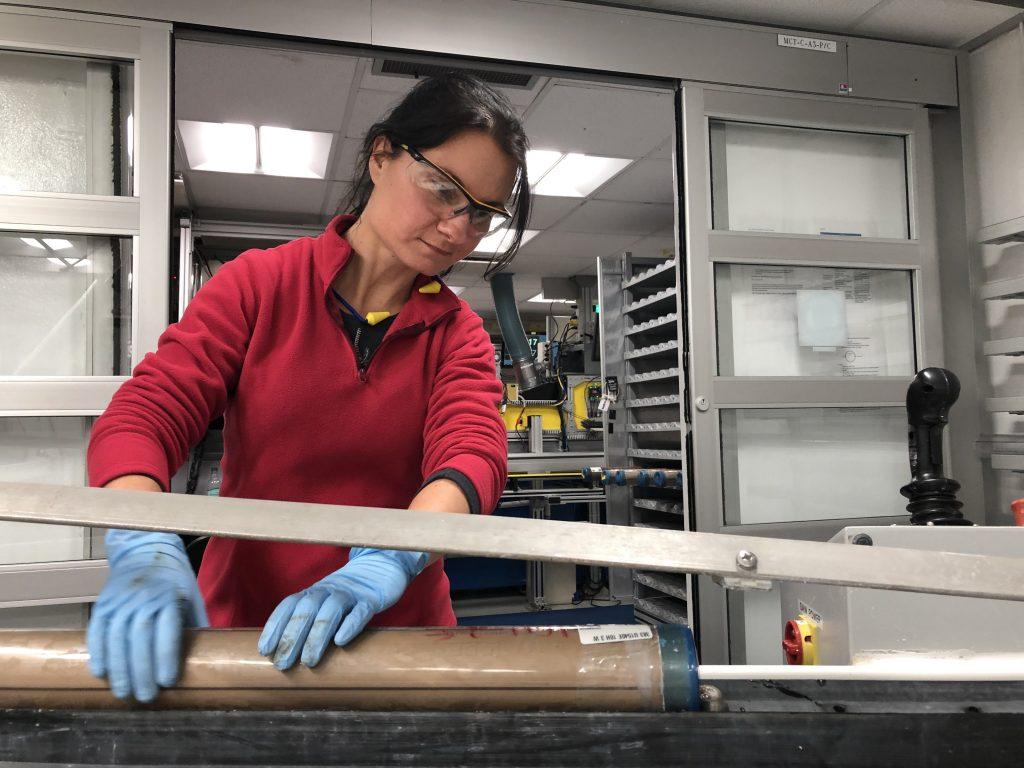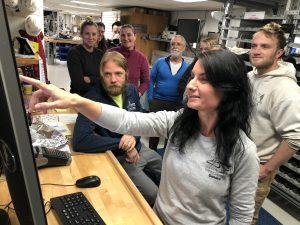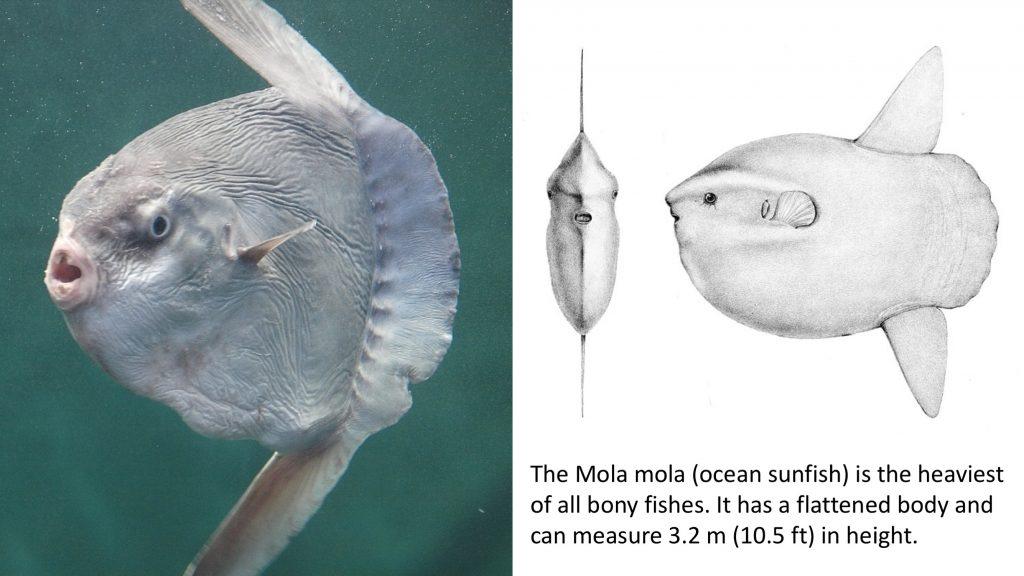
Career Spotlight: Assistant Laboratory Officer Sandra Herrmann

Sandra Herrmann Interview
Please describe your job duties while on the JR. What will you be doing on a daily basis?
-
-
-
-
-
-
-
-
- As Assistant Laboratory Officer, I primarily oversee the technicians on shift as lab foreman. This includes acting as curator while the curator is off shift, keeping the core running smoothly through the core lab, and temporarily function as liaison between SIEM, IODP and tech crew when the Operations Superintendent and Laboratory Officer are off shift.
- I also manage the IODP ship store, keep inventory updates for consumables and parts, receive all on-coming freight, prepare off-going freight (physically and paperwork) and coordinate with SIEM on the dock and on the ship.
-
-
-
-
-
-
-
Describe one instrument or tool that is essential for you to do your job? Or a piece of equipment on the JR that is useful and why – what does it do?
-
-
-
-
-
-
-
-
- I use our asset management system a lot. The system manages all the shipping/inventory/property information at IODP for laboratories and engineering (drilling) equipment on the JOIDES RESOLUTION and back on shore. That is a lot of information. We would not be able to conduct smooth operations without this database in the background and a group of people that are the keepers of all the odds and ends.
-
-
-
-
-
-
-

Why is your work (or research) important? What question are you trying to answer or how does your work/research help assist/advance scientific knowledge?
- For each expedition, the Assistant Laboratory Officer works with the Expedition Project Manager to determine if a scientist need special consumables/parts and how much of it based on their research plan. This is where the expertise and experience from both, technical aspects and insights of the ship laboratories and scientific understanding have to play well together in order to guarantee the success of the upcoming mission. As ALO, I then contact vendors, order and organize the equipment in advance, so the science on board can be done the way it is intended. On the ship, I help the scientists set up their laboratory space, give them safety orientation and get them started.
Why the ocean? What made you choose a career at sea or career that involves the ocean?
- I got my PhD as paleontologist/sedimentologist. I also have a Master in Geology. While I was pursuing the PhD, I applied to sail as nannofossil paleontologist on one of the JR expeditions, Expedition 324, Shatsky Rise. I saw the world out here on the JOIDES RESOLUTION and fell for it. I now have more than eight years of sea-going experience on this vessel. Being part of the success story of the Ocean Discovery and Drilling Program is a part of my life that I am very proud of. I like the simple life on the ship. The work is streamlined and efficient. The sunrises and sunsets are gorgeous. The ocean shows a different face every day. What’s not to like?
What are you most excited about for this expedition and/or being on the JR?
- I am always excited to come back to the JR. It is my second home; my second family is here to catch up with and adventures lie ahead. I like the atmosphere at port call, the excitement of the first few days, and seeing how the expedition project slowly develops over the 8 weeks timespan.
What are three things you think are needed for a successful expedition at sea? And Why!
- Cohesion: The willingness to pull together to achieve the goal of the mission. This mindset is essential. Each expedition we accomplish a tremendous workload that is only possible because each person is pulling his/her weight.
- Sleep: It can be tough to get quality sleep in this environment, especially when the seas are rough.
- Hobbies: You can’t work and then sleep for 12 hours. Everybody finds something to do, be it movies, sport, reading or long conversations. It’s hard to find a balance, but one develops a pattern over time.
If you could answer one question about our Earth – what would it be and why?
- Evolution was always a fascinating topic to me. I learned about the concepts during biology and paleontology classes, applied them during my studies and it gave me insights into the evolution of life. Evolution favors the human race. We are the species that changes the face of the earth like no other being before. Where does it lead?
What is your favorite sea creature and why?
- Mola mola (sunfish). They are rare and seem out of this world. I saw one during one of my expeditions on the JR. It looked up at me standing outside on the starboard side of the JR Focsle Deck before it vanished back into the blue.

When did you know you wanted to pursue a career in science or an ocean science career?
- I did not know that I would end up where I am right now. I followed my gut feeling starting at being the only student pursuing all natural sciences in a language school, studying geology and branching of into paleontology. My Masters was entirely based on fossil spores and pollen on land. For the PhD, I made a jump to marine paleontology and learned about IODP. Now, as part of a support group for our daily operations, I get to interact with all disciplines of geosciences.
What do you personally hope to gain or experience while on EXP383?
- I am looking forward to being close to Point Nemo, it’s another item on the bucket list. As always, I furthermore hope that we recover interesting cores for the scientists, so that unexpected secrets of the earth can once more be revealed.
What message do you have for anyone considering a career at sea or a career involving the ocean sciences?
- Try it out, follow your dreams and don’t let anybody talk you out of it.
What do you do back home when not on the JR?
- I work at International Ocean Discovery Program (IODP) in the office on shore. I prepare/order/organize consumables/part/equipment for upcoming expeditions and I am involved in software development projects for core description, description visualization and inventory management.
Do you get sea sick? If yes or sometimes, please also select the other tab and describe how you cope with it.
- No
The need for space comes in many forms. Which type of space, in general, is the most important to you?
- _X__Personal Space
- ___Creative Space
- ___Outdoor Space
- ___Emotional Space
- ___Physical Space
- ___Spiritual or Meditative
- ___Outer Space
- ___Community Space
- ___Quite Space
- __Productive/Work Space
- ___Digital/Virtual Space
- ___Public Space
- ___Inner Space
- ___Other:
Why that type of space? What makes it important to you and will it be available while on the JR?
- Personal space to exercise, read a book, or just ponder thoughts. It is important to take care of your body and mind if you are in this remote environment. I try to workout at 4-6 times a week, eat healthy and enjoy a good book in my cabin. Everybody deals with the challenges of this unique setting in different ways, for me having enough personal space makes it possible to do this job on a long-term basis.